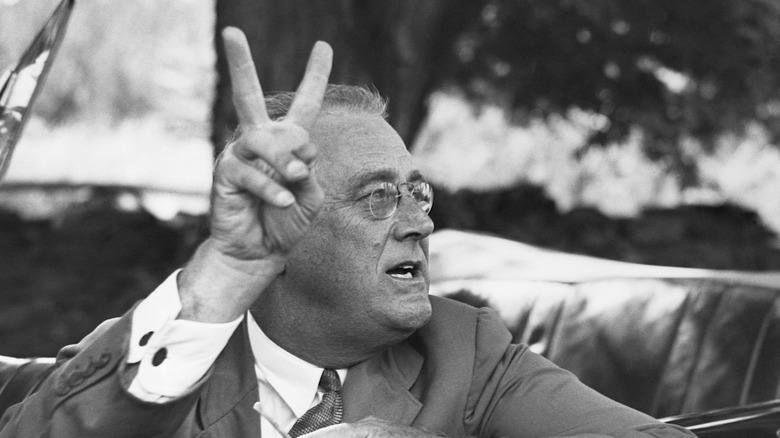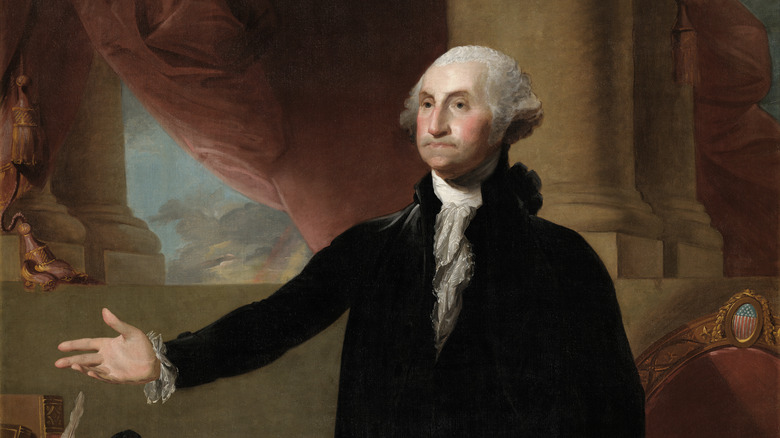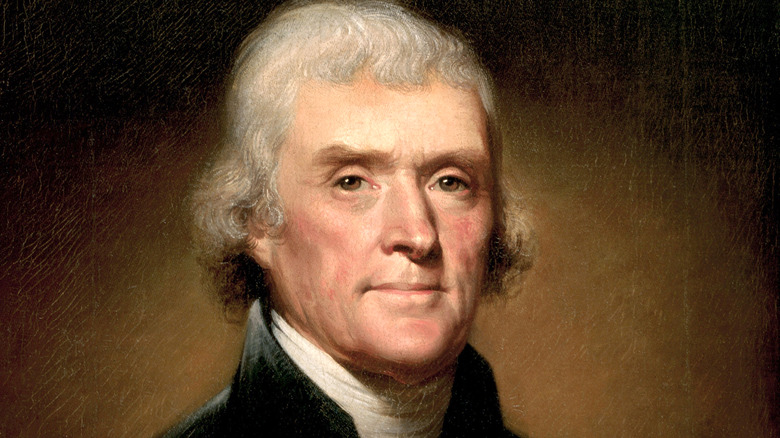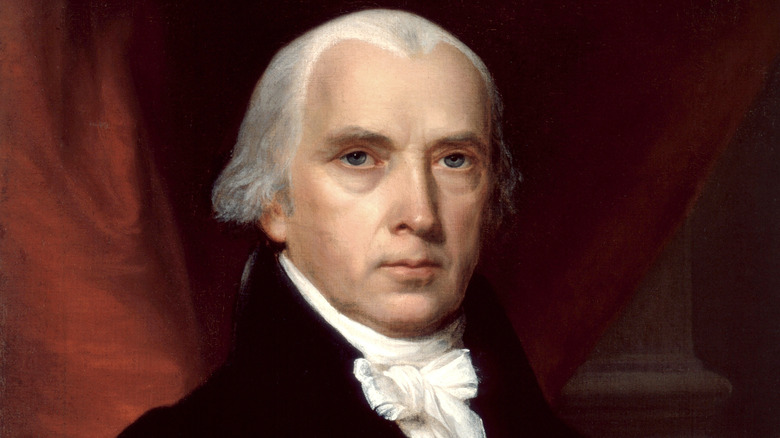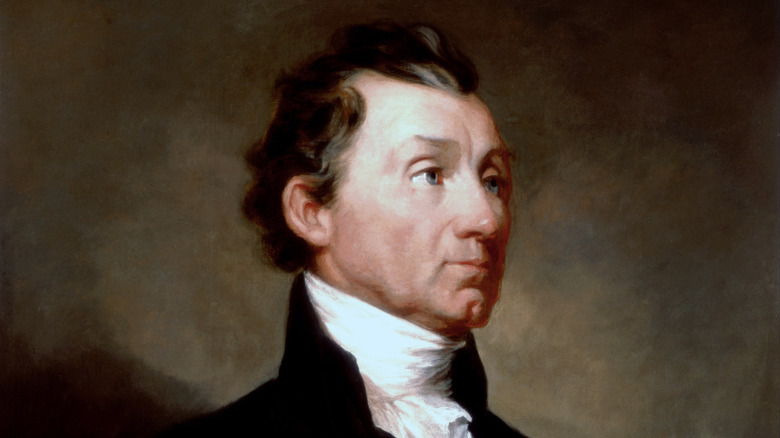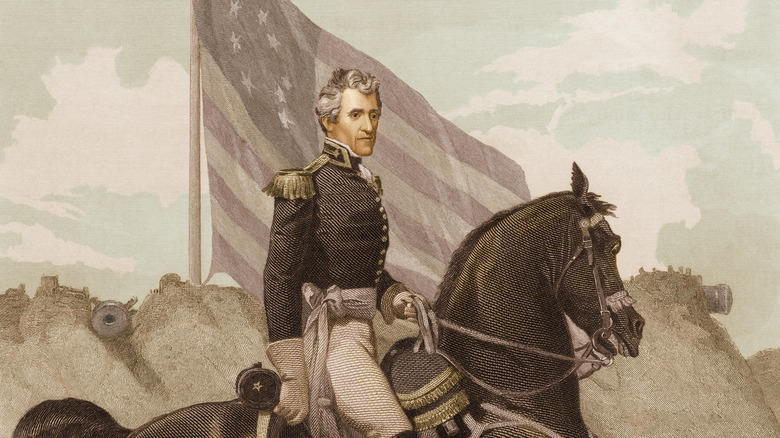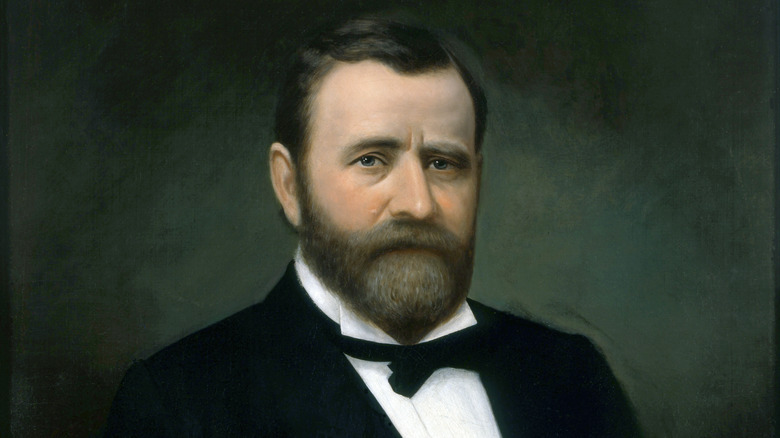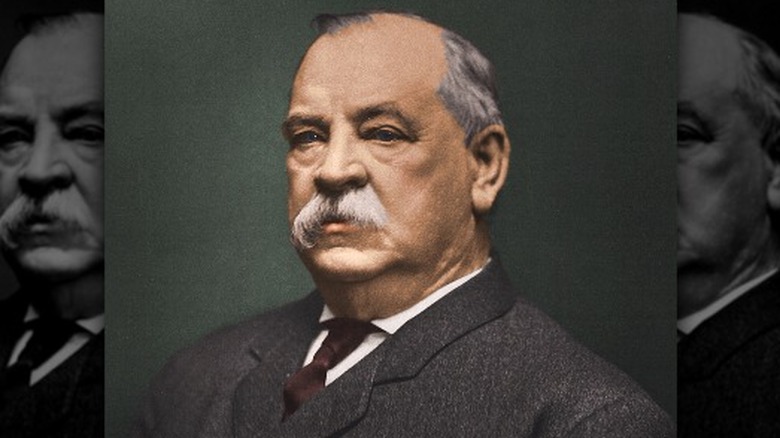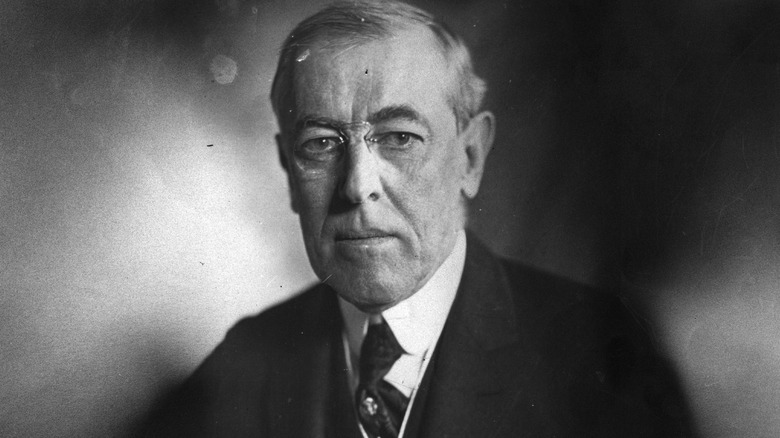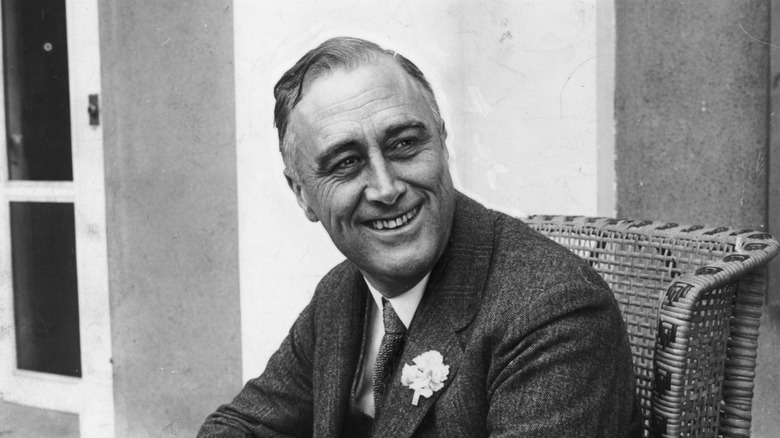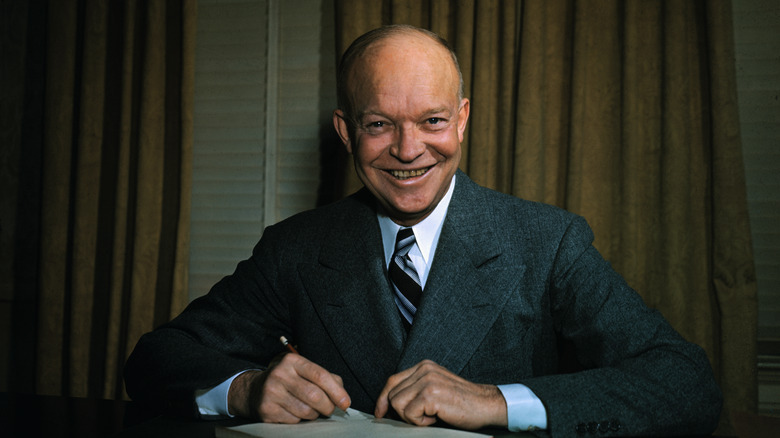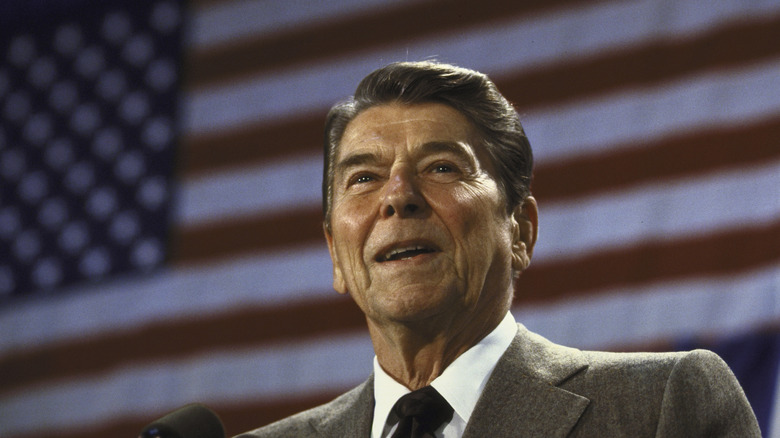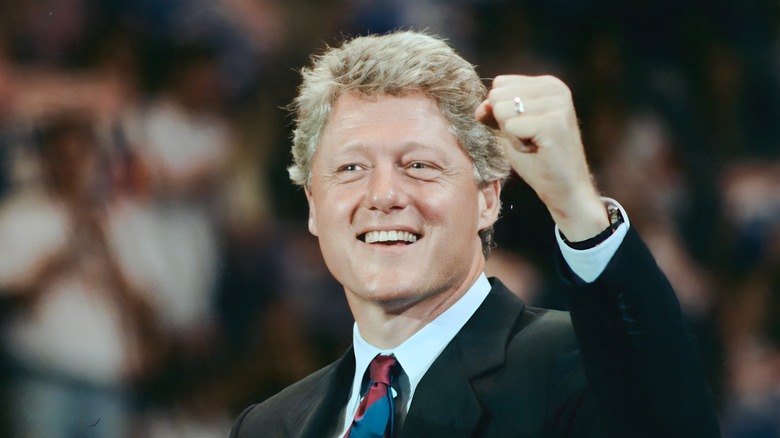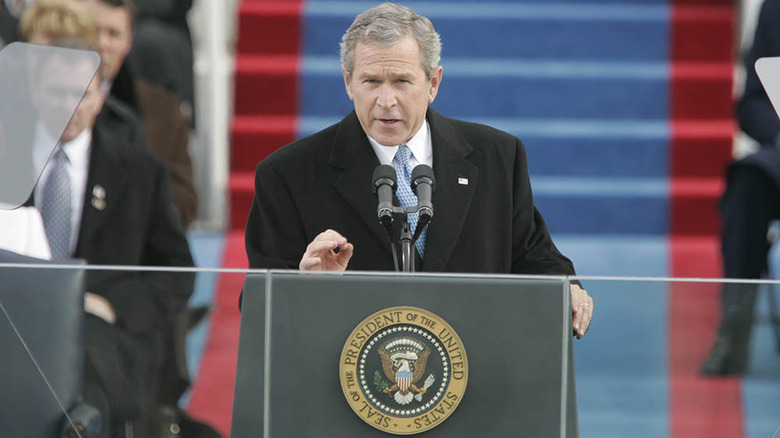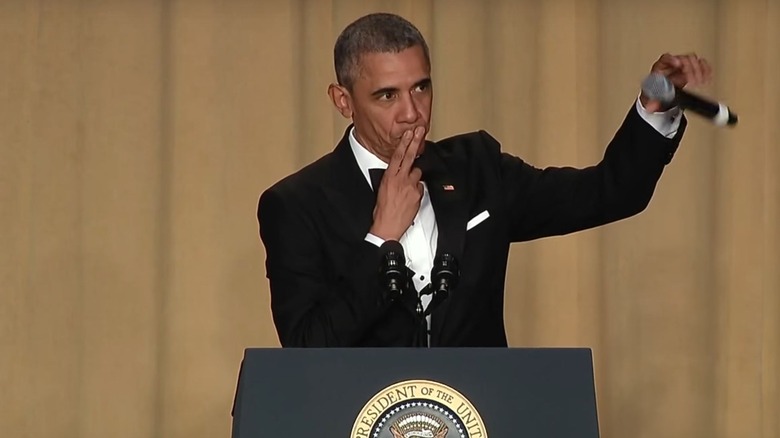The 14 Presidents Who Served A Second Term
Since its founding, the United States has had quite a few presidents to lead it, some of whom are remembered for fond reasons, and others who might be remembered slightly less fondly. And, on the other hand, some aren't widely remembered at all, at least outside of circles of American history buffs, going up against some steep competition: George Washington, Abraham Lincoln, and the like.
When you look at the numbers, however, you'll find there's a particular distinction that at least some of them must have. With 46 presidents elected to serve four-year terms over the past two and a half centuries of American history, some of them certainly served at least twice. Or, at least twice, to be technical about it. It's a fairly exclusive club, though, with just over a dozen presidents managing to serve multiple terms, and doesn't necessarily include several of the most popular or recognizable names of American politics — Lincoln and Kennedy, for example.
Still, the administrations of each of these particular presidents were interesting in their own way, sometimes marked by scandals of various types, or often coinciding with some of the most influential events in history. The American Revolution, the Civil War, and the Cold War, among others — all were influenced and represented through the actions and the legacies of these American presidents.
George Washington
For anyone who knows anything about American history, George Washington is probably a pretty familiar name. Honestly, there probably aren't too many people more commonly or closely associated with the United States than its first president, who served from 1789 to 1797. And that's for completely understandable reasons.
Prior to the existence of the U.S., Washington had already built a reputation for himself as a result of his military service during the Seven Years' War (otherwise known as the French and Indian War), as well as simply his status as a wealthy Virginian landowner. But he really made his mark on history during the Revolutionary War, as the commander in chief of the colonial army — a charismatic leader, even if not the most tactically minded, which ultimately was enough to win the war.
In the years following, Washington looked to retire to private life, but the political scene wouldn't quite allow that. Given the respect he commanded equally from members of opposing parties, he was unanimously voted in as the first president, and in that position, he did what he could to promote unity and earn respect for the country on the world stage. Ultimately, the public wanted him to stick around for a third term, but he declined, instead choosing to live out the rest of his life at his home of Mount Vernon.
Thomas Jefferson
Despite being the third president of the United States, Thomas Jefferson is also pretty well known for the things he accomplished outside of the presidency, which he held from 1801 to 1809. Or, to be blunt, the Declaration of Independence might be his biggest claim to fame. That said, it's far from his only impact on American history.
When it comes to his politics prior to his presidency, he managed to stir up a fair bit of controversy, mainly as part of the heated debates (to put it rather lightly) between the new Federalist and Democratic-Republican parties. Said debates actually led to some doubt when it came to Jefferson's presidency, but arguably, the more notable part of that time period involved France. Both the things often regarded as positive — the deal for the Louisiana Purchase, brokered with Napoleon Bonaparte and which changed the balance of power on the North American continent — as well as those which weren't quite as well received, such as some shaky economic decisions as the Napoleonic Wars battered Europe.
However, there are also other things to bear in mind, because the Founding Fathers were far from saints — Jefferson included. Despite being known for his writings on values like liberty and freedom, he was very much a product of his time, with those same writings also preaching markedly racist ideologies.
James Madison
While the United States' third president was perhaps most well known for writing the Declaration of Independence, its fourth president, James Madison, was the man largely considered "the father of the Constitution," as well as being one of the major proponents of the Bill of Rights. All quite an impressive resume, even before taking the presidency.
However, Madison's two terms in office — from 1809 to 1817 — were pretty heavily affected by international relations. He effectively inherited the issues surrounding the United States' stance on the conflict between Britain and France from his predecessor, and in dealing with those problems, he found his administration at odds with Britain. With British ships seizing American ships and sailors, tensions continued to rise, eventually boiling over in the War of 1812.
Public perception of Madison and his actions during the war varied greatly as it ran its course. The start was markedly rocky, with opponents painting Madison as a weak pacifist while the military struggled, due to both refusals by Congress to take action as well as Madison's own mistakes regarding military leadership. And beyond that, the image of British troops laying waste to Washington D.C. as the president fled wasn't one that inspired much hope. Nonetheless, fortunes improved by the war's end, and an American victory also turned Madison's public image, making him a rather beloved and respected public figure.
James Monroe
When it comes to the fifth president of the U.S., James Monroe, there are typically a few different lenses through which his time in office is viewed, a period that lasted from 1817 to 1825. The most fanciful is the "Era of Good Feelings," a decade largely coinciding with Monroe's presidency, in which the American public, rather literally, felt good. Friction between political parties had reached a low point (granted, because there was only one real party at the time), and European politics had relatively little effect on American soil. However, that's not to say that the "Era of Good Feelings" was without its problems.
It's worth noting that the beginning of Monroe's second term in 1820 saw the passage of the Missouri Compromise, a piece of legislation meant to deal with the issue of enslavement in states newly admitted to the union. Without delving too deeply into the details, it suffices to say that it was a divisive decision — just the start of many more clashes that would lead to the Civil War.
Then, there's the Monroe Doctrine — a proclamation that, in short, named North and South America as the United States' sphere of influence. The U.S. would stay out of European affairs, and, in return, European nations would temper their colonial tendencies. It was a fairly common view of American politicians at the time, but the Monroe Doctrine has garnered quite a legacy since, cited throughout the early 20th century as justification for the U.S. intervening in the affairs of its neighbors (intervention which those neighbors often didn't want).
Andrew Jackson
Andrew Jackson is a controversial figure, to say the least, and there are a lot of details that contribute to this entire argument. To go in chronological order, prior to becoming the seventh president of the U.S., Jackson was actually a respected and well-recognized war hero, known for his feats of military prowess during the War of 1812. He was a popular figure, to put it lightly, and one with humble beginnings — something none of his predecessors could exactly claim. Arguably, his election in 1829 signified a change in American democracy, both in terms of where political power could come from geographically, but also in the fact that it basically birthed the two-party system seen to this day.
But it's impossible to discuss Jackson without discussing the blemishes on his legacy. For one, there was a lesser-known depression that hit in 1837, the last year of Jackson's presidency. Though the official panic came under the following presidency of Martin van Buren, it's largely been attributed to Jackson refusing to recharter the bank, then requiring that gold be used for particular purchases.
But the more infamous of Jackson's policies is, without a doubt, the Indian Removal Act of 1830. Native American people were forced off their homelands time and time again, such that those lands could be used, instead, for white settlers. Of course, that ties into the notorious Trail of Tears, in which thousands of Native Americans (Cherokee, specifically) were made to travel westward — a harrowing journey that led to thousands of deaths.
Ulysses S. Grant
The 18th president of the U.S. might just be known more for his military service than his actual presidency. After all, Ulysses S. Grant was the general in command of the Union armies during the Civil War, and was known for his innovation and flexibility as a leader. He was seen as a war hero in the aftermath — for good reason — and has continued to hold onto that legacy as the years have passed.
His tenure as president, from 1869 to 1877, is remembered in a considerably different light, though not necessarily due to his own faults. Reconstruction was going on at the time, as the former Confederate states were reinstated to the Union, which colored a decent amount of Grant's presidency. He met those problems with an eye turned toward peace, showing clemency where needed. At the same time, though, he did what he could to keep in mind the hardships of Black Americans — the 15th Amendment was ratified during his administration, and various other acts were also put into place, which were meant to keep Black voters safe from harassment. That said, the efficacy of those attempts (and their legality) is somewhat debatable.
Then there are the markedly less positive things that the Grant administration is remembered for: namely, a handful of scandals. Despite Grant himself trying to combat federal corruption, it still ran rampant; the financial panic called Black Friday came about because of attempts to influence the gold market, and Grant's own secretary was implicated in a scandal known as the Whiskey Ring.
Grover Cleveland
Most of the time, when a president wins two terms in office, one term immediately succeeds the next. That's always been the way it's gone, except for the case of Grover Cleveland, who has the distinction of being both the 22nd and 24th president. The technical oddities don't even end there. That middle term that he lost to Benjamin Harrison? He actually won the popular vote by a margin of about 100,000, only to lose the electoral college vote, leading to Harrison's swearing in as the 23rd president.
But there's more than just strange trivia to be had here. Cleveland made his name in politics for seemingly being against the use of political power. Before his first term as president — as well as during it, from 1885 to 1889 — he was most known for using his power to strike down acts of Congress that seemed excessive or unnecessary. It earned him the popular image of being an honest politician, one whom the average citizen could trust.
Unfortunately, that particular tactic didn't serve quite as well during his second term, which lasted from 1893 to 1897. A depression hit early on, and, well, Cleveland's insistence that the problems would solve themselves — and that the government would do nothing to help the lives of people who were suffering — earned the ire of the public. Combined with his apparent willingness to work with the robber barons of the day, as well as his occasionally discriminatory views, Cleveland's second term wasn't exactly the most impressive.
Woodrow Wilson
Given how influential World War I was, it understandably sent ripples through American politics at the time. And so it also follows that the president during this period — from 1913 to 1921 — Woodrow Wilson, is worthy of mention in the annals of presidential history.
That said, the first few years of Wilson's presidency were more heavily marked by legislation designed for domestic, rather than international, purposes. Many of the acts passed during his administration circled around business practices and higher standards regarding working conditions. No more child labor, an eight-hour workday, the Federal Trade Commission — all good things. However, it should also be mentioned that Wilson was born in the Confederacy, and his racial views did bleed into the implementation of segregation within the federal government, among other things.
But then World War I rolled around, and Wilson's popularity rose — first for keeping the U.S. out of the war at its outset, then for being an effective leader when it did join on the side of the Allies. However, Wilson's most notable achievement came after the war's end, in the form of the League of Nations, an international forum meant to keep the peace. The idea actually won Wilson the Nobel Peace Prize, but ideas and execution aren't necessarily the same thing. In fact, the U.S. didn't even join the League of Nations, and with the organization often incapable of enforcing any of its decisions, it was largely ruled a failure – though the general principle was resurrected in the form of the United Nations.
Franklin D. Roosevelt
Much can be said about Franklin D. Roosevelt, and the fact that he was the president throughout much of the Great Depression and World War II encompasses much of it. Then, there's also the bit of trivia that he's not only the only president to have surpassed the two-term tradition set by George Washington, but he was actually elected to a staggering four terms, lasting from 1933 to 1945 — though he died early in his fourth term.
Roosevelt entered the presidency as the country was struggling under policies that failed to combat the Great Depression. He arrived with his promises of his New Deal and delivered, in the form of a veritable swath of various acts and federal organizations aimed at creating new jobs and providing relief from hardship. Those efforts, as well as his so-called fireside chats, in which he would address the public over the radio, also had other effects. While the economy did begin to rebuild throughout the 1930s, perhaps even more impactful was the hope that it gave to the people.
It took more than the New Deal to completely revive the economy, however, and it was actually World War II itself that managed this. Despite isolationism being the prominent ideology, Roosevelt cautioned against it and passed legislation that allowed the U.S. to aid Britain and France through financial and material means. Japan's attack on Pearl Harbor led to the American entrance to World War II in earnest, and, well, the rest is history.
Dwight D. Eisenhower
Dwight D. Eisenhower was an extraordinarily popular president during his term from 1953 to 1961, one that could be summed up best by his catchy campaign slogan: "I like Ike!" Despite that, he didn't start out as a politician; rather, he came from an extensive military background, rising to prominence when he was appointed supreme commander of the Allied Expeditionary Force. He ordered the launch of the Normandy Invasion, also known as D-Day, which was no small achievement, and immediately after the end of the war, he was also put in charge of organizing the military forces for the North Atlantic Treaty Organization (NATO).
A lot of that success seemed to come from Eisenhower simply being personable and easy to work with (aside from notable military talents, of course). He was so likable, in fact, that he was eventually approached by both the Democratic and Republican parties to run for president; he would run on the Republican ticket, but regardless of his affiliation, he endeared himself to the public for his relatable, apparently middle-class ways and hobbies.
Politically, his administration was largely concerned with rising Cold War tensions. That included plenty of international travel and discussions with Soviet leader Nikita Khrushchev (which ultimately fell apart), brokering peace at the end of the Korean War, and the aptly named Eisenhower Doctrine, which promised American support to Middle Eastern countries fighting against communism. And there was also the creation of NASA as a response to the launch of Sputnik — just one of his many achievements.
Ronald Reagan
While many presidents have come from political, legal, or military backgrounds, Ronald Reagan has the unique distinction of arriving on the political scene after both serving in the Army and working as an actor. It's a strange start, but one that made him popular among his supporters, as he came off as affable and charismatic.
Quite a bit happened during his two terms in office, from 1981 to 1989. For one thing, there's the fall of the Soviet Union — fitting, for Reagan's stance as a staunch anti-communist. Strained relations only worsened as Reagan increased the military budget and pitched his Strategic Defense Initiative (popularly known as "Star Wars"). But, over time, the arrival of a more moderate Soviet leader in Mikhail Gorbachev eventually led to increased talks and decreased tensions, including genuine arms reductions. And when it comes to scandal, there was the Iran-Contra Affair, in which members of the Reagan Administration were found to be supplying arms to not only countries that supported terrorism, but also funds to Nicaraguan insurgents known as Contras.
Regarding domestic policy, Reagan's goals made him something of a hero for the Republican party — an image that's lasted (and is still being perpetuated) into the modern day. His economic policies involved cuts to many relief and welfare programs alongside tax cuts, which ultimately plunged the country into recession and considerably grew the national debt. Rolling back some of those changes did eventually lead to overall growth, but likely at the cost of widening the gap between the rich and poor.
Bill Clinton
American politics can seem terribly divisive, even on the best of days. It's an apparent characteristic of the modern political landscape, but it wasn't too long ago that Bill Clinton won election by running as a centrist Democrat, with aims less toward ideals traditionally championed by the Democratic party, but rather toward what the American people actually wanted. Overall, his moderate approaches during his 1993 to 2001 presidency won him the respect of people on both sides of the political spectrum.
In terms of domestic policy, his administration oversaw the passage of legislation regarding the environment, education, and women's safety — in keeping with said administration itself being made up of plenty of women and people of color. Not only that, but the economy saw steady, historic growth during his tenure. Then, on the international stage, he oversaw an agreement between Israel and Palestine in an attempt to bring peace.
All that said, though, his administration wasn't without its faults. "Don't ask, don't tell," was a weak compromise regarding LGBTQ+ folk in the military that satisfied no one. And, of course, there's all the scandal. Multiple people in Clinton's administration had been accused over the years of various crimes, and Clinton himself was famously accused of an affair with White House intern Monica Lewinsky. He was impeached for perjury, having lied — far from gracefully — about it all to the court. Eventually, he was acquitted, and the event lives in infamy — though he managed to remain a popular president through it all.
[Featured image by Kenneth C. Zirkel via Wikimedia Commons | Cropped and scaled | CC BY-SA 4.0]
George W. Bush
The nature of many presidencies tends to be colored by the larger issues at play on the world stage, and that is definitely true when it comes to George W. Bush. Following a very close and somewhat confusing election in 2001, Bush entered the Oval Office shortly before one of the most tragically influential events of recent history: the September 11 attacks.
With the tragedy at the front of everyone's mind, Bush's policies during his two terms, which ran from 2001 to 2009, leaned toward what he termed the "war on terrorism," and a heavy increase in domestic security. Those increased security measures were both bold and very controversial. The National Security Agency was secretly given the ability to casually look in on phone calls and emails of everyday American citizens — a rather uncomfortable breach of privacy that Bush's administration worked hard to provide justification for. And both the CIA and administrators at the new prison in Guantanamo Bay were accused of using abuse and torture during interrogation, as well as engaging in trials that seemed like they might violate the Geneva Convention.
Internationally, the war on terror largely culminated in attempts to stop terrorism before it could start. It also manifested as Operation Iraqi Freedom (or the Iraq War), which was waged on the belief that the country possessed weapons of mass destruction. But not only did the war rage far longer than expected, killing thousands of American troops, no evidence was ever found of such weapons.
Barack Obama
Lasting from 2009 to 2017, the two terms of the first Black president of the U.S. were marked by tension, though Barack Obama himself is still largely seen as a popular president. And the problems his administration dealt with remain eerily familiar into the 2020s.
On the international stage, there were the wars in Iraq and Afghanistan, with U.S. military presence ending in the former, but actually increasing in the latter — intended to combat the rising threat of the Taliban. And while terrorism persisted, Obama's administration did see a major victory on that front: the 2011 assassination of al-Qaeda leader Osama bin Laden. Domestically, one can't ignore the 2008 recession, which was met with a large stimulus package, as well as sweeping financial reform. Improvements came, but slowly and unevenly, which drew criticism, both for the lack of speed as well as the monetary cost, amidst the growing national debt. That said, the domestic policy Obama is perhaps most known for is his healthcare reform, built around healthcare being a right rather than a privilege — something he proved passionate about — making its popular name of "Obamacare" rather fitting — but which opponents argued against due to its cost.
Political divisions were an unfortunately regular feature of Obama's presidency, leading to fights over all sorts of issues: healthcare, gun control, the national debt, and more. With the government even shutting down briefly as a result, Obama himself has since expressed regret over not being able to do anything about said partisanship as divisions only grew even sharper.
